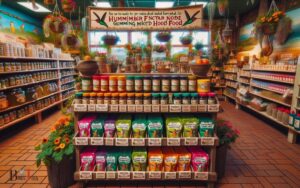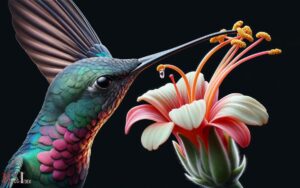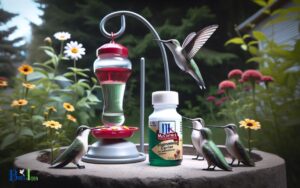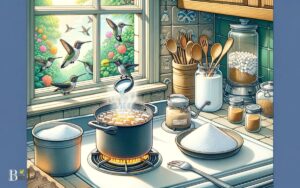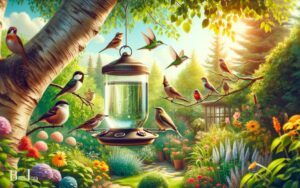Do Squirrels Eat Hummingbird Food? Yes!
Yes, squirrels do eat hummingbird food, specifically the sweet nectar that is commonly placed in hummingbird feeders.
These adaptable rodents are known for their ability to consume a variety of foods and may take advantage of the readily available sugar solution intended for hummingbirds.
Squirrels are opportunistic feeders and have a diet that includes fruits, nuts, and seeds, among other things.
Their attraction to hummingbird food is primarily due to the high sugar content of the nectar, which provides a quick and easy energy source.
Here are some points to consider:
- Squirrels have a keen sense of smell that can lead them to sources of sugary foods, including hummingbird feeders.
- The design of some hummingbird feeders may not be squirrel-proof, allowing these persistent animals to access the nectar.
- Squirrels’ agile climbing and leaping abilities help them reach feeders that might otherwise be considered out of reach.
Implement squirrel deterrents and feeder designs to protect hummingbird nectar and support peaceful cohabitation in your garden.
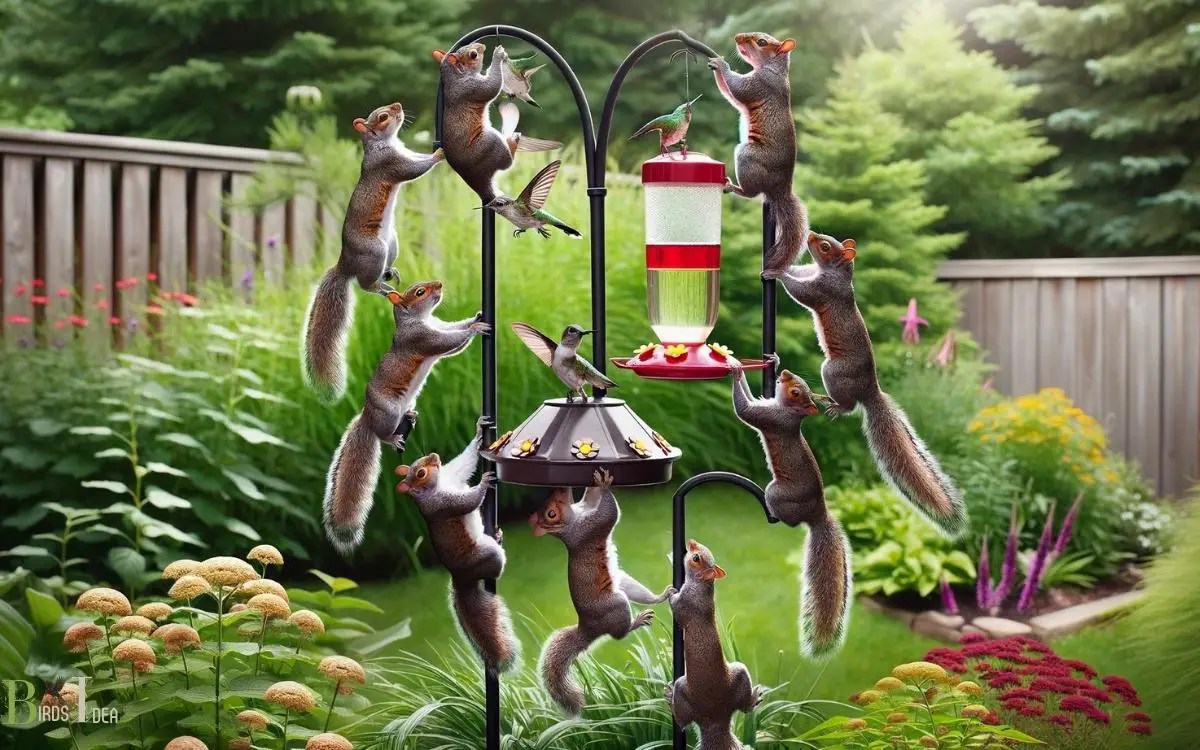
Key Takeaway
Squirrel Behavior Around Feeders
Squirrel interactions with feeders can significantly impact the feeding behavior of other backyard wildlife.
Their acrobatic antics often result in spillage, leaving behind a feast for ground-feeding birds and small mammals.
This may disrupt the intended feeding patterns and preferences of other creatures, such as hummingbirds.
Squirrels are notorious for their persistence and ingenuity in accessing bird feeders, often deterring smaller birds from feeding.
This behavior can create an imbalanced ecosystem around the feeding area, affecting the availability of resources for different species.
Understanding and managing squirrel behavior around feeders is crucial for maintaining a harmonious and diverse backyard wildlife habitat.
Now, let’s delve into the subsequent section about ‘hummingbird food preferences’ to gain insights into creating an environment that serves the needs of all backyard creatures.
Hummingbird Food Preferences
When it comes to hummingbird food preferences, understanding the sweet nectar attractants that appeal to these delicate birds is crucial.
Squirrels are known to be attracted to sugary substances, posing a potential threat to hummingbird feeders.
Implementing effective strategies to prevent squirrel access to hummingbird feeders is essential for ensuring that the nectar remains exclusively available to the intended avian visitors.
Squirrels and Hummingbirds
Exploring the dietary preferences of squirrels and hummingbirds reveals insights into their respective feeding behaviors and competition for resources.
- Dietary Preferences: Hummingbirds primarily feed on flower nectar and insects, while squirrels are known to consume nuts, seeds, fruits, and the occasional insect or bird egg.
- Feeding Behaviors: Hummingbirds are agile flyers, using their long bills to extract nectar from flowers, whereas squirrels are adept climbers and forage on the ground and in trees for their preferred food sources.
- Competition for Resources: While both squirrels and hummingbirds may be attracted to similar food sources such as sugar water in hummingbird feeders, providing separate feeding stations can help minimize competition and ensure that both species can access their preferred food without conflict.
Sweet Nectar Attractants
The dietary preferences of hummingbirds include primarily feeding on sweet nectar from flowers and, to a lesser extent, consuming insects.
When creating a hummingbird-friendly environment, it’s essential to understand their food preferences to attract and serve these delightful birds.
The following table outlines the sweet nectar attractants that hummingbirds are particularly drawn to:
| Nectar Attractant | Examples |
|---|---|
| Flowers | Trumpet vine, Bee balm |
| Homemade Nectar | Sugar water (4:1 ratio) |
| Commercial Nectar | Ready-to-use nectar mixes |
| Trees and Shrubs | Red buckeye, Cardinal flower |
Understanding these sweet nectar preferences can help in attracting hummingbirds to your garden or feeding stations.
Next, let’s explore strategies for preventing squirrel access to hummingbird food sources.
Squirrel Deterrent Methods
Squirrel deterrent methods significantly impact hummingbird feeding, requiring effective strategies to minimize squirrel access to hummingbird food sources.
- Use Squirrel-Proof Feeders: Invest in specialized feeders designed to prevent squirrels from accessing hummingbird food. These feeders often feature mechanisms that close off access to the food when a squirrel’s weight is detected.
- Place Feeders Strategically: Position feeders away from trees, fences, or other structures where squirrels can launch themselves onto the feeder. Hang feeders from a high, thin wire to make it difficult for squirrels to reach.
- Utilize Squirrel-Repellent Methods: Consider employing natural or commercial squirrel repellents around the feeding area to deter squirrels from approaching the hummingbird food source.
Impact on Bird Behavior
Hummingbird feeding behavior can be significantly influenced by the presence of squirrels near their food sources.
Squirrels are known to disrupt the peaceful feeding environment of hummingbirds, causing them stress and potentially deterring them from feeding.
This can lead to a decrease in hummingbird visits to the feeders, impacting their health and overall well-being.
Impact of Squirrels on Hummingbird Feeding Behavior
| Effects | Description |
|---|---|
| Increased stress | Hummingbirds experience heightened stress due to squirrel presence. |
| Decreased visits | Squirrels reduce the frequency of hummingbird visits to feeders. |
| Potential deterrence | Hummingbirds may avoid feeding altogether, affecting their health. |
Understanding the impact of squirrels on hummingbird feeding behavior emphasizes the importance of addressing this issue to provide a conducive environment for these delicate birds.
Transitioning into the subsequent section about ‘hummingbird feeder placement’, it is essential to consider optimal locations to further support the feeding habits of hummingbirds.
Hummingbird Feeder Placement
Optimally positioning hummingbird feeders can directly enhance their feeding habits, ensuring a consistent and reliable food source for these delicate birds.
To achieve this, consider the following:
- Shelter: Place feeders near trees or shrubs to provide perches and shelter, allowing hummingbirds to rest between feeding.
- Visibility: Position feeders in an open area, visible from different angles, to allow hummingbirds to spot them easily and feel secure while feeding.
- Protection: Hang feeders at a height that deters predators like cats and squirrels, ensuring the safety of the hummingbirds while they feed.
Signs of Squirrel Activity
When assessing the presence of squirrels around hummingbird feeders, it is essential to be aware of the signs of their activity in the surrounding area.
One common sign of squirrel activity is the presence of chewed or gnawed areas on feeder poles or nearby trees.
Squirrels may also leave behind small, half-eaten nuts or seeds near the feeder. If you notice holes dug in the ground beneath the feeder, this could indicate squirrel activity, as they often bury and stash food for later consumption.
Furthermore, the sound of scurrying or rustling in nearby trees or bushes, especially during the day, may suggest squirrel presence.
Understanding these signs will help in identifying and addressing the issue of squirrels around hummingbird feeders.
To prevent squirrel access and maintain a peaceful feeding area for hummingbirds, it’s important to implement effective strategies.
Squirrel-Proofing Strategies
Effectively safeguarding hummingbird food from squirrel interference, what strategies can be employed to ensure long-term protection?
One effective strategy is to use squirrel-proof feeders specifically designed to prevent squirrels from accessing the food.
These feeders typically have features such as weight-activated perches that close off access to the food when a squirrel’s weight is detected.
Another strategy is to place the feeders on poles with baffles that prevent squirrels from climbing up to reach the food.
Additionally, using hot pepper-infused nectar can deter squirrels, as they are sensitive to the heat, while hummingbirds are not.
Regularly cleaning up any spilled food and securing the food source in a well-protected area can also help in squirrel-proofing the hummingbird food.
By implementing these strategies, one can effectively protect the hummingbird food from squirrel interference, ensuring a pleasant experience for both the hummingbirds and the individuals serving them.
Do Hummingbirds and Woodpeckers Have Similar Diets?
Do hummingbirds and woodpeckers have similar diets? While some factors of their diets overlap, woodpeckers and hummingbird food largely differ. Woodpeckers primarily feast on insects, larvae, and tree sap using their strong beaks, while hummingbirds rely on nectar from flowers for sustenance. Their food preferences reflect their distinct feeding behaviors and adaptations.
Coexisting With Squirrels
Squirrels can be managed through various methods to peacefully coexist with them while providing food for hummingbirds.
To achieve a harmonious environment, consider the following strategies:
- Install squirrel-proof feeders: Invest in feeders specifically designed to deter squirrels, such as those with weight-activated mechanisms or baffles.
- Offer squirrel-friendly food sources: Place squirrel feeders filled with nuts and seeds in a separate area of the yard to divert their attention away from hummingbird feeders.
- Create physical barriers: Utilize squirrel baffles on poles and trees to prevent squirrels from accessing hummingbird feeders.
Conclusion
Squirrels are known to seek out and consume hummingbird food, which can impact the feeding behavior of hummingbirds.
It is important to be aware of signs of squirrel activity and take steps to prevent their access to the food.
By implementing squirrel-proofing strategies and finding ways to coexist with squirrels, we can ensure that hummingbirds are able to feed undisturbed.
Just as the industrious squirrel searches for food, we must work diligently to protect the feeding habits of the delicate hummingbird.


